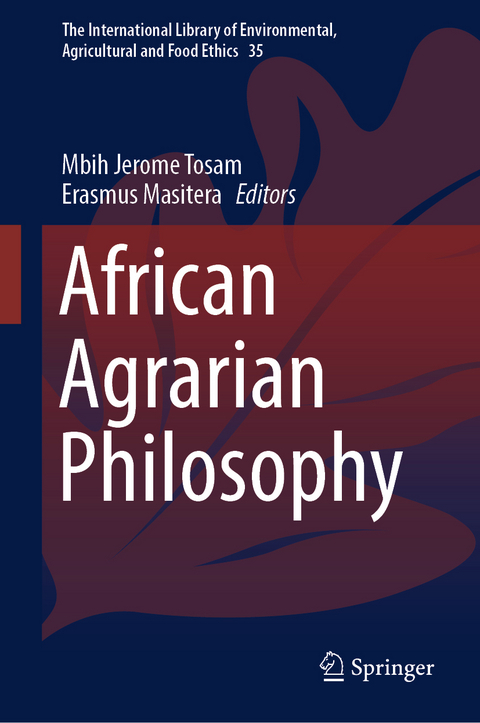
African Agrarian Philosophy
Springer International Publishing (Verlag)
978-3-031-43039-8 (ISBN)
Mbih Jerome Tosam is senior lecturer and chair of philosophy at the University of Bamenda, Cameroon. He obtained his PhD in philosophy from the University of Yaoundé I, Cameroon, in 2011. His research interests are in the areas of bioethics, environmental ethics, philosophy of medicine, and African philosophy. Some of his recent publications include: "The Moral Status of the Human Embryo: a Critique of Peter Singer's Conception of the Potentiality of the Embryo," International Journal of Philosophy and Theology 3, no. 2, (2015): 39-47; Philosophy in Culture: Perspectives from Western and African Culture, co-edited with Peter Takov (Mankon, Bamenda: Langaa 2016); and "Global Emerging Pathogens, Poverty, and Vulnerability: An Ethical Analysis" in ed. Godfrey B. Tangwa et al., Socio-cultural Dimensions of Emerging Infectious Diseases in Africa: An Indigenous Response to Deadly Epidemics (Springer, 2019).
Murimi munhu: A quest for decoloniality in 'small scale' subsistence farming in Zimbabwe.- The Kom Trilogic Worldview and Agrarian Philosophy.- Human Relation to Nature and African Agrarianism.- Manifestations of Bekwarra Agwunihe Philosophy in Land Ownership and Agricultural Practices.- The Confluence of African Agrarianism and Permaculture: Some Observations and Implications.- Bekwarra Communal Values, Food Ethics and Folkloric Conception and Interpretations of Animal-Human Relations.- Agrarian philosophy, community and Adam Smith: African agrarian economics.- Unpacking Ndebele agrarian metaphors for the promotion and preservation of communal social development.- The religious significance of mushrooms among the Shona people of Zimbabwe: An Ethnomycological approach.- In search for a pedagogy of African agrarian philosophy.- The Shona 'Zunderamambo' (agricultural welfare system) as a model for social responsibility: A task for higher education systems.- Julius Nyerere's Ujamaa as an agricentric Philosophy of Education: A Response to the crises of education in Africa.- Contemporary challenges in the development and use of agrarian communities' local indigenous knowledge and practices for sustainable agriculture and climate adaptation: The Case of North West Cameroon.- Necessity Is The Mother Of Invention: Famine-induced Adoption Of Conservation Farming "Dhiga-hudye/Dig and eat" In Chivi Communal Lands Of Zimbabwe.- The practice of African traditional medicine and agrarianism in Zimbabwe: The Quest for this Karanga Agrarian Practice in Madamombe area of Chivi District.- Land Ethics among the Traditional Annangs of Southern Nigeria: Traditional Environmental Ethics, Challenging Contemporary Hostilities towards our Planet.- The Farm-Village Practice of Yorubas in West-Central Africa.- An Historical Appraisal of the Fig Tree (Ghim) and Dracaena (Nkeng nkeng) in Traditional Rulership of Bali Chamba Polities.- Towards Sensitising and Reorienting Contemporary Bekwarra against Deforestation: Prospects and Challenges.- African Endogenous Knowledge and Sustainable Development: Evolving an African Agrarian Philosophy.- Shangwe Environmental Ethics: A Panacea for Agrarian Problems in Gokwe.- Indigenous knowledge and agro-based livelihood dynamics in the Western Highlands of Cameroon.- Agrarian Rituals, Food Security and Environmental Protection in the Bamenda Grassfields of Cameroon.- Indigenous African Eco-communitarian, Agrarian Philosophy: Lessons on Environmental Conservation and Sustainability from the Nso culture of North West Cameroon.- 'Defending a Relational Account of Animal Moral Status'.- Farming and Animals Welfare in the African Context.- The Inseparable Connection between African Metaphysics and African Agrarian Philosophy.- The Phenomenon of Male and Female Crops and Gender Equality in Igbo-African Agrarian Culture.- The Farm in Colonial and Postindependence Imagination: A Crisis of Continuity.- Conceptual frameworks for anAfrican Sustainable Agriculture: Beyond John Locke, the Cold War and the Scramble of World Religions.- Henry OderaOruka'sParental Earth Ethics as ethics of duty towards ecological fairness and global justice.- Socio-economic practices and pseudo-prosperity in the cocoa producing village of Bombe Bakundu (Cameroon), 1945-2000.- Food Security as a Fundamental Human Right: A Philosophical Consideration from Africa.- Consumer Activism: Towards Redirecting the Moral economy of Food.- Rethinking Shangwe Traditional Philosophy in Resolving Agrarian Wrangles in Contemporary Gokwe Communities.
| Erscheinungsdatum | 01.02.2024 |
|---|---|
| Reihe/Serie | The International Library of Environmental, Agricultural and Food Ethics |
| Zusatzinfo | XIII, 396 p. 4 illus., 1 illus. in color. |
| Verlagsort | Cham |
| Sprache | englisch |
| Maße | 155 x 235 mm |
| Gewicht | 816 g |
| Themenwelt | Geisteswissenschaften ► Philosophie ► Allgemeines / Lexika |
| Geisteswissenschaften ► Philosophie ► Ethik | |
| Schlagworte | African Agrarianism • African Environmental Philosophy • African Philosophy • African Philosophy of Agriculture • African Philosophy of Nature • Indigenous African Knowledge Systems |
| ISBN-10 | 3-031-43039-5 / 3031430395 |
| ISBN-13 | 978-3-031-43039-8 / 9783031430398 |
| Zustand | Neuware |
| Haben Sie eine Frage zum Produkt? |
aus dem Bereich


